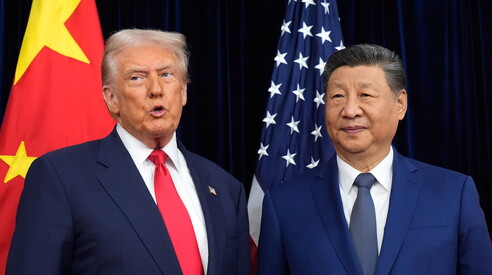What Europe can and must do to escape the trap between America and China


AP photo, via LaPresse
Unhappy degrowth
Driving technological progress and revolutions in growth and productivity are two factors: attitude and approach, that is, a production model built on permanent innovation and cultural availability, even before economic availability.
In the aftermath of Busan, the summit that sealed a truce rather than a turning point in the US-China trade war , it remains clear that both sides each have a powerful weapon to blackmail their adversaries. Trump's United States is doing so through its accordion-style ban on exports of advanced semiconductors to China , as seen in the cases of Nvidia and Nexperia. China is using its acceleration and deceleration of its ban on rare earth exports to the same end . And Europe remains a mere spectator , because such strategic excellence is not part of its manufacturing and technological specializations. In this context, it is more necessary than ever to finally abandon the whining that characterizes the European and Italian approach. We are not innocent victims. We have made dramatic mistakes at home. And now those mistakes must be quickly remedied, knowing that it will take years to mitigate our strategic dependence and the decline of our industry. Instead, the prevailing theory remains that "China screwed us over. It joined the WTO 25 years ago but has never fought on equal terms, with massive state subsidies and copy-pasting our technologies." It's a valid accusation, and it's our fault for not reacting, but in any case, whining won't help us make a single step forward.
The truth is, someone had predicted what would happen to Europe from the beginning. At an economists' forum in 2003, three years before being awarded the Nobel Prize in Economics, Edmund Phelps made a prediction that left everyone speechless. Germany would decline compared to both China and the US, he said, and would drag European industry down with it. Because, he added, Germany would remain convinced it could play a leading role in Europe and the world by defending its excellence in mid-tech products like automobiles, the heart of German manufacturing. Meanwhile, in the coming years, industrial dominance would be entirely focused on high-tech. This is precisely what has happened, as demonstrated by the nearly three years of German recession, driven downward by the structural crisis of its major auto groups. This crisis, due to the strong interdependencies between production chains, has also been dragging down Italian industrial production for the past 28 months.
Wolfgang Munchau , now director of Eurointelligence after decades of often hyper-polemic journalism, rightly wrote on UnHerd (a British website founded seven years ago by a conservative journalist and a hedge fund manager) that Europe has failed to understand a fundamental point for twenty years . This is the point at the heart of the thinking of economist Joel Mokyr, who also recently won the Nobel Prize in Economics . His 2016 book, " A Culture of Growth ," is based on a fundamental principle. Technological progress and revolutions in growth and productivity are driven by two factors: attitude and approach, that is, a production model built on permanent innovation and a cultural, even more than economic, willingness to embrace even very profound transformational effects. The China of the modernization efforts launched in the 1980s lacked these characteristics, and consequently flooded the most advanced US universities with its own students. The United States has always remained open to the creative destruction approach of new technologies, but has lost out in productivity and efficiency in mid-tech manufacturing. Europe's manufacturing system was not particularly open to open innovation, except for the growing role of manufacturing robots. Its cultural heritage, however, lacked and still lacks a proactive approach to the revolutions brought about by new technologies—ICT yesterday and AI today. Furthermore, Europe has further harmed itself by pursuing a supposed "ethical superiority," with its barrage of regulations such as the Green Deal, Fit for 55, ETS, and corporate reporting directives. On digital matters, from the GDPR to the AI Act, the EU demands that companies adhere to stifling standards for certifying risks deriving from the technologies they adopt—the exact opposite of the push for acceleration and simplification adopted by the US and China to spread the new AI revolution throughout their production structures. A strategy that China has just strengthened with the guidelines for its next five-year plan.
So, there's no point in continuing to complain. Either the European political and economic leaders decide to revolutionize their approach and fully embrace innovation, fundamentally correcting their regulatory errors, or their decline will be the result of a colossal mistake: believing that our mid-tech industry is eternal, when, in life as in the economy, nothing is.
More on these topics:
ilmanifesto





